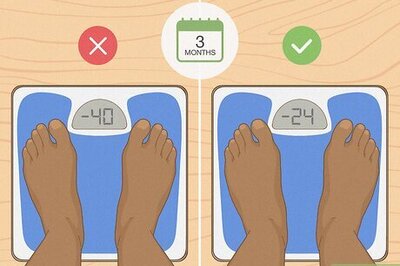
views
Point Pleasant, New Jersey: Election Day turnout was heavy on Tuesday in several storm-ravaged areas in New York and New Jersey, a welcome change from crisis to catharsis for many who saw exercising their civic duty as a sign of normalcy amid lingering devastation.
Lines were long in Point Pleasant, NJ, where residents from the Jersey Shore communities of Point Pleasant Beach and Mantoloking had to cast their ballots due to damage in their hometowns from Superstorm Sandy.
Many there still have no power eight days after the storm pummeled the shore.
Sarah Brewster of Long Beach, N.Y., was shaken when she entered a school to vote and noticed the clocks were all stopped at 7:27. That's the time on Oct. 29 when everyone in her community lost power. Tears streamed down her face as she emerged from the school cafeteria. Brewster, who works at a nonprofit, said voting is "part of our civic responsibility in the midst of all this crisis."
Retired customer service agent Joan Andrews, who fled her trailer in Moonachie by boat a week ago, said, "I always have to vote, especially now." Many friends of the 68-year-old woman were too overwhelmed to vote, but Andrews said she'd encouraged them to take the time.
"Oh my God, I have been so anxious about being able to vote," said Annette DeBona of Point Pleasant Beach. "It's such a relief to be able to do it. This is the happiest vote I ever cast in my life."
The 73-year-old restaurant worker was so worried about not being able to vote that she called the police several days in advance, as well as her church, to make absolutely sure she knew where to go and when. She was one of the first to cast a ballot in her neighboring town, choosing Mitt Romney over President Barack Obama.
"I truly believe Romney is an honest, caring man," she said. "He will lift us out of our spiritual and mental depression and help us believe again."
Renee Kearney of Point Pleasant Beach said she felt additional responsibility to vote this Election Day.
"It feels extra important today because you have the opportunity to influence the state of things right now, which is a disaster," said the 41-year-old project manager for an information technology company.
She had planned all along to vote for Obama, but said her resolve was strengthened by his response to Sandy.
"I was extremely impressed by his response to the storm," she said. "For people who were not so certain about him, I think this may have sealed the deal."
Authorities in New York and New Jersey used shuttle buses to take some displaced residents to their polling sites and fielding phone calls and emails from voters confused about where they were supposed to go.
New York City Elections Commissioner J.C. Polanco said lines were long even in areas of the city most devastated by Sandy's wind and water. He said voters in the Rockaways area of Queens were casting ballots at a school where nine polling locations had been merged into one. Other voters in the Rockaways and one precinct in the Bronx were voting in tents powered by emergency generators.
"We are asking New Yorkers to be patient. People are going to be standing on line for very long time," Polanco said.
The efforts put a premium on creativity. At a public school in Staten Island's Midland Beach, flares were set up at an entrance to provide light, and voting machines were retrieved from inside the school and moved into tents where voters braved 29-degree temperatures as they lined up.
At another Staten Island school, there were no official signs referring them to a new polling place. Those who arrived on foot were taken to the correct location by a shuttle bus, officials said. A hand-written sign eventually was placed at the school's driveway.
New Jersey Gov. Chris Christie was accompanied by his youngest daughter when he voted soon after learning that power had been restored to his home.
"I'm amazed at how resilient people are. I think there's tremendous interest in the election here and nationwide," Christie said.
New York Gov. Andrew Cuomo signed an executive order Monday allowing residents to cast a so-called affidavit, or provisional ballot, at any polling place in the state for president and statewide office holders, an opportunity New Jersey was extending to voters as well. Provisional ballots are counted after officials confirm a voter's eligibility.
At a news conference Tuesday, Cuomo urged New Yorkers to cast their ballots.
"It's important that we vote, it's important that the system works," Cuomo, a Democrat, said. "This is a critical election ... and who's in charge matters."
Authorities were also sensitive to concerns about potential disenfranchisement and were taking steps to ensure voters were kept informed of continued problems or changes to their voting locations.
Ernie Landante, a spokesman for the New Jersey Division of Elections, said fewer than 100 polling places around the state were without power, compared with 800 just days ago, and said the state has abandoned earlier plans to use military trucks as makeshift polling places. Most voters will be able to cast ballots at their regular polling sites, he said.
Landante also said the state had taken extra steps to make sure people displaced by Sandy would be able to vote, like allowing "authorized messengers" to pick up as many mail-in ballots as they request for people in shelters or away from their homes.
"We are doing everything we can in this extraordinary situation not to disenfranchise voters displaced by Sandy. Their voices and their votes will be heard no differently than anyone else's," he said.
But authorities abruptly switched gears on an additional directive that Christie's office announced on allowing displaced New Jersey residents to vote via email and fax.
The directive allowed voters to request and file a ballot electronically. But under pressure from voting rights advocates, officials said those voters would have to submit a paper ballot along with the electronic filing - a rule the state's military personnel and residents living overseas are required to follow as well. Initially, the state was going to waive the paper ballot requirement.
Some voting rights advocates weren't satisfied with last-minute change, saying it made the situation that much more confusing for voters.
"It seems like this now opens the door for a lot of potential litigation," Rutgers-Newark Law School Penny Venetis said.
















Comments
0 comment